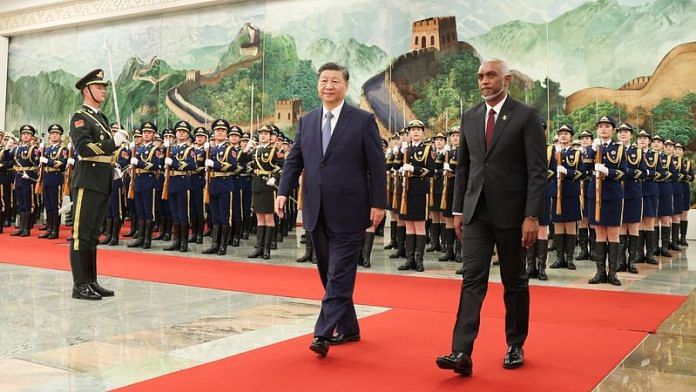Navigating the intricate geopolitical dynamics of South Asian countries requires resisting the temptation to oversimplify them into a pro-China or pro-India binary. However, this oversimplified narrative resonates in the case of the Maldives.
The victory of Mohamed Muizzu in the presidential elections in September last year has thrust this small Indian Ocean archipelago into the spotlight. His campaign slogan ‘India out’ and alignment with China have reignited interest in the country’s foreign policy outlook. This holds serious implications for India’s ‘neighbourhood first’ policy and impacts both New Delhi and Beijing’s outreach in the Indian Ocean Region.
Maldives is tilting towards China
Anti-India sentiments have propelled the Muizzu administration towards China. This shift became apparent when, breaking from tradition, he chose Turkey for his first overseas visit instead of India. Later, from 8-12 January, during his five-day state visit to China, a red carpet was rolled out, signifying both China’s desire to court the Maldives and the Maldives’ clear intent to strengthen ties with China while distancing itself from India.
This was also apparent from Muizzu’s statement just after returning from Beijing. “We are not a country that is in the backyard of another country… We may be small, but that does not give you the licence to bully us,” he emphasised. On January 14, the Maldives demanded the withdrawal of Indian troops from its territory, setting 15 March as the deadline.
The social media controversy between India and the Maldives over Lakshadweep spilled over into real-world policy, prompting several influential Chinese users on Weibo to share photos and videos from their vacations in the Maldives. They actively encouraged fellow Chinese citizens to consider the Maldives as their preferred holiday destination.
Increasing divergences between India and the Maldives have caught attention of Chinese media and academia alike. A professor from Sichuan International Studies University cautioned India against perceiving the China-India-Maldives dynamic as a zero-sum game. Another commentary criticised Indian media and commentators for considering the Maldives’ alignment with China as “betrayal”, saying it shows their lack of respect for the Maldives.
Muizzu’s election triumph and his confrontational stance towards India, however, are being widely celebrated on Chinese social media. Numerous Weibo users see it as a victory for China and unfavourable news for India. Muizzu’s ‘India Out’ campaign garnered praise, and his support for China’s Belt and Road Initiative (BRI) was hailed as a positive development, showcasing his preference for China over India.
Interestingly, on TikTok, videos with #ChinaMaldivesfriendshipbridge received over 100,000 views. Muizzu reciprocated this warmth by documenting his engagements in China on TikTok, aiming to showcase both his personal and his country’s interest in cultivating closer ties with the Chinese.
Also read: Bullying Maldives is India’s latest gladiator sport. It’s not how strong nations behave
China’s win-win partnership
Chinese President Xi Jinping called Muizzu “an old friend”, upgraded relations to the level of comprehensive strategic cooperative partnership, and signed 20 agreements across a wide range of areas. However, the primary motivations behind China’s growing engagement with the Maldives continue to be the containment of India and the pursuit of strategic interests in the Indian Ocean Region.
Muizzu’s tilt aids China in keeping India confined within the ‘South Asia box’, as emphasised by India’s External Affairs Minister S. Jaishankar in his book The India Way. In the China-Maldives joint statement, a subtle reference to India was also made: “The two countries have always respected and supported each other, setting a fine example of equality, mutual benefit and win-win cooperation between countries of different sizes.”
During his visit, Muizzu also gave his endorsement to every initiative introduced by China over the past couple of years. It is a victory for China as the Maldives endorses and embraces the BRI, described by a Weibo user with close to 1.2 million followers as ‘a morally grounded project aimed at improving infrastructure and living standards in developing countries.’ The Maldives already owes US$ 1.3 billion to China. This unwavering and unquestioning allegiance to the BRI may potentially guide the Maldives down a path similar to that of Sri Lanka. However, on the other hand, the Maldives’ endorsement of the BRI is advantageous for China, especially as several major countries view the initiative with apprehension and maintain a distance.
China also persuaded the Maldives to publicly adhere to the so-called ‘One China’ principle. The Maldives explicitly recognised Taiwan as an inalienable part of Chinese territory at a time when the world is moving away from strict adherence to the ‘One China’ policy and has been exploring economic prospects with Taiwan.
This is not a novel approach for some South Asian countries to navigate between India and China, strategically leveraging the competition between the two countries to maximise their own interests—an approach that has not proven advantageous for many in the long run.
Following his return from China, Muizzu, without explicitly mentioning India, asserted that the Maldives would not succumb to intimidation and bullying. Yet, the question arises: how prudent is it to distance oneself from India only to align with China, potentially becoming a client state and entangled in debt?
Sana Hashmi, PhD, is a fellow at the Taiwan-Asia Exchange Foundation and George HW Bush Foundation for US-China Relations. She tweets @sanahashmi1. Views are personal.
(Edited by Prashant)



